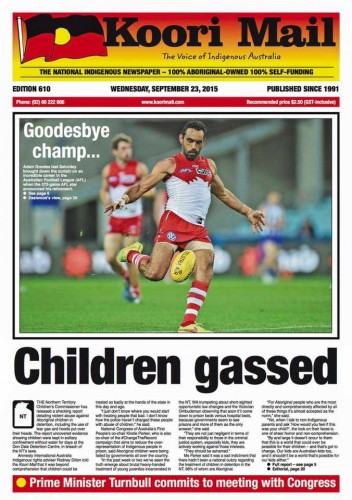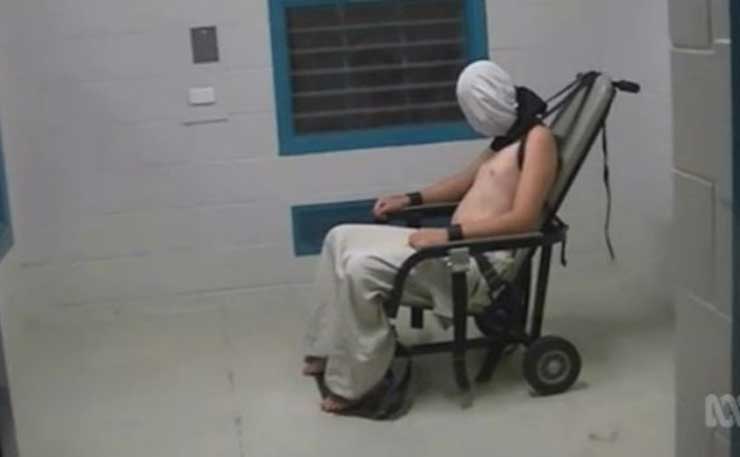The revelations overnight from ABC’s Four Corners program must shock Australians into action, writes Chris Graham.
The most shocking thing about last night’s Four Corners expose into juvenile detention in the Northern Territory is that anyone is actually shocked.
What, exactly, did we think would happen? And why have we been ignoring stories like these for years?
We had the same reaction when the inevitable revelations emerged about torture, rape and abuse on Nauru. Are our memories really that short? Are we really that naive a nation?
But back to the brutality we level against our own.
Here’s a link to a brief version of a lengthy from page story in the Koori Mail from September 2015, which details the abuse at the centre of the Four Corners report. The clue is in the headline: Children Gassed.
And here’s a story from Crikey in January this year, from the very barrister, John Lawrence, at the centre of these latest allegations. He’s actually talking specifically about the gassing incident depicted on Four Corners last night.
The story was first published in the Land Rights News in October last year, and pursued by Bob Gosford – a Darwin-based writer – in his Crikey blog The Northern Myth.
And yet, it took video of the incident for anyone to actually give a stuff.
Here’s a story in The Conversation from last year, discussing the outrageous levels of incarceration of black kids.
Here’s a link to New Matilda, when you search the term ‘indigenous incarceration’. 81 stories, take your pick. You might like to focus on this story from Amy McQuire in July 2015 which details allegations of abuse at the Don Dale detention centre.
It begs the question: why aren’t we listening? And why do we need video evidence of brutality for it to stick?
On that front, there’s a few uncomfortable truths we need to face.

The first is what we saw on Four Corners overnight is how authorities behave when they know they’re being recorded. Can you imagine how they behave when they think they’re not?
Here’s how: Senior Sergeant Chris Hurley beat Mulrunji Doomadgee to death on the floor of the Palm Island watchhouse in 2004.
Even so, shortly after Mulrunji lay dying, writhing in agony on the floor of his cell, video recorded a Palm Island police officer kicking him to see if he was awake. He was dead.
The same video recorded Hurley a few minutes later sliding against the wall to the floor, with his head in his hands, after realizing what he’d done.
And yet, Hurley was acquitted by a jury for the killing. We didn’t have video of the actual flogging, so Hurley went on to a long and more prosperous career in the Queensland Police, until non Aboriginal people starting becoming his victims (he fired his gun at a car during a police chase, and then threatened a female colleague in a separate incident).
Here’s another example: The police who killed John Pat in WA, or Lloyd Boney in NSW knew they weren’t being filmed. The correctional officers who cooked Mr Ward to death in the back of a prison van in WA knew they weren’t being filmed as well.
Daniel Yock’s death in Brisbane wasn’t filmed. The list goes on.
While some of these deaths have sparked outrage, none of them have sparked change. All of them happened silently, and all of them required activism and intervention for anyone to take the matters seriously.
Which begs another question, and brings us to our second uncomfortable truth: Why can’t we just believe Aboriginal people, when they tell stories of the brutal violence perpetrated against them by people in authority?
If a single Aboriginal person tells a story of systemic abuse, you might demand more evidence. But when all Aboriginal people tell these stories… and they do, why the silence? I don’t know a single Aboriginal family who doesn’t include at least one person who has experienced violence and brutality at the hands of police and custodial officials.
I could count on one hand the number of white families I know in the same circumstances (ironically, my own family is one of them).
I understand that to most Australians, this concept might be hard to reconcile. Because authority figures generally don’t treat us like that, and most of us will never go to jail, or know someone who does. But this treatment of Aboriginal people – and this reality of incarceration – is common, widespread. Aboriginal people themselves have been talking about it for decades. They’ve talked about it openly, and they’ve been ignored or not believed.
And so what happened last night – what will happen today, and tomorrow and next week and next month and next year – is what has always happened, whether it’s in prison, in a police station, within the child protection system, or across any part of the Aboriginal life experience you choose to focus on.
Blackfellas will raise these issues. Blackfellas will be ignored. But if an issue does break through, it won’t result in any meaningful change. Like the death of Mulrunji, the death of Mr Ward, and on and on it goes.
The cycle continues.
There were 339 recommendations from the Royal Commission into Aboriginal Deaths in Custody. Chief among those was that incarceration rates be reduced. Since 1991, rates across the nation have increased exponentially, while at the same time the majority of the 339 recommendations have never been implemented.
In the Northern Territory, Aboriginal people make up almost 90 per cent of the prison population. In juvenile justice it’s 96 per cent. But it doesn’t have the worst record. Western Australia jails its Indigenous population at the highest rate on earth. The incarceration rate of black males in WA is more than eight times greater than it was at the height of Apartheid in South Africa (this from a state that last week announced it would be closing more than 100 remote Aboriginal communities, to deafening silence from the Australian population).
No state or territory in Australia jails black males at a rate less than Apartheid South Africa.
I’ve written those words countless times over the last decade. So have many others. John Pilger was talking about them even earlier. And yet, nothing has changed. Those words never reverberate. Our black incarceration rates continue to climb.
The fact is, we refuse to listen. We refuse to learn the deadly lessons of our tragic, outrageous past and present.
Precisely the same thing will happen with a Royal Commission into juvenile justice, which NT Chief Minister Adam Giles is already conceding must occur.
Even so, that’s not reason enough for it not to occur. The RCIADIC has put on the historical record the lives and deaths of 99 Aboriginal people. That is crucially important.
Yet another Royal Commission will not achieve justice for Aboriginal people, but it will shine a light on the behaviour of people in power. And it will vindicate Aboriginal people, who’ve been saying this for decades.
The tragedy, of course, is that in a first world nation, the best a third world population can hope for is just that – vindication. The best they can hope for is that one day, finally they’ll be believed.
While we learn that lesson, every Australian has a role to play. You must maintain the rage and revulsion that you feel this morning. You must help make this stick.
Share stories online about this latest outrage. Tell your family and friends. Write to you local member. Don’t drop this issue. And believe Aboriginal people when they tell you what is going on. And support them if they ask for it.
And don’t accept a whitewash. A Royal Commission must not simply focus on the Northern Territory. It must not simply focus only on what happens when Aboriginal people get locked up.
For a very, very long time, Aboriginal people have been calling for a Royal Commission not into what happens when Aboriginal people end up in custody, but how they get there.
They must finally be listened to. They must finally be supported.
This latest outrage must look beyond the walls of Don Dale and Berrimah jails. It must be a national inquiry, supported by the Turnbull government and the Shorten Opposition.
* The author Chris Graham tweets here and Facebooks here.
Donate To New Matilda
New Matilda is a small, independent media outlet. We survive through reader contributions, and never losing a lawsuit. If you got something from this article, giving something back helps us to continue speaking truth to power. Every little bit counts.





